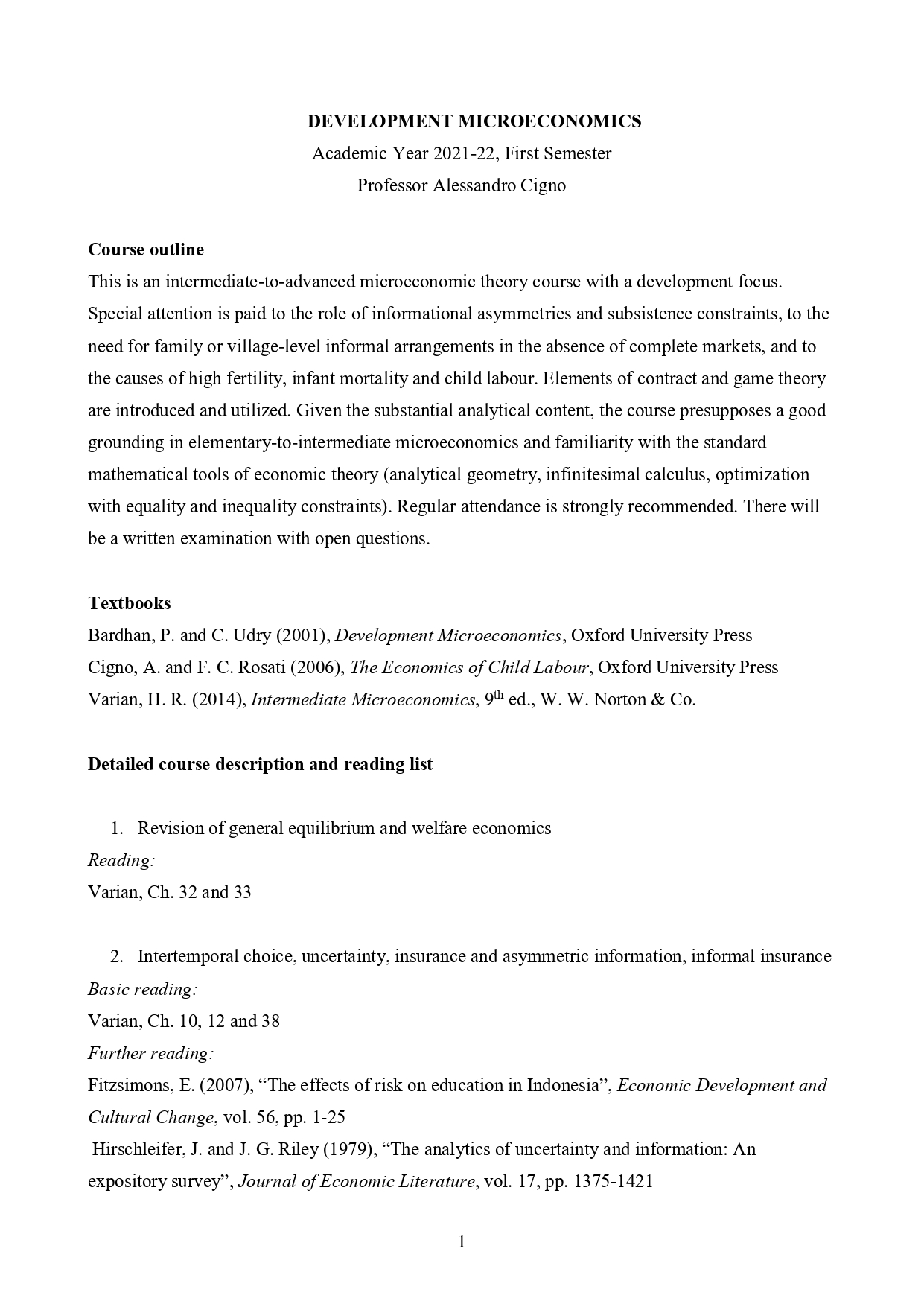
This is an intermediate-to-advanced
microeconomic theory course with a development focus. Special attention is paid
to the role of informational asymmetries and subsistence constraints, to the need
for family or village-level informal arrangements in the absence of complete
markets, and to the causes of high fertility, infant mortality and child
labour. Elements of contract and game theory are introduced and utilized.
- Docente: CIGNO ALESSANDRO
- Docente: BACCI SILVIA
- Docente: CIPOLLINI FABRIZIO
- Docente: GUSELLA FILIPPO
The course appears in the web-pages of the Universita' di Firenze with three different labels, but it is ONE COURSE only:
B000212: Econometria (Curriculum Istituzioni e Mercati - E52)
B016456: Microeconometrics (Curriculum Development Economics - E20)
B028961: Microeconometrics Single Module (Curriculum Economics - E19)
- Docente: CALZOLARI GIORGIO
- Docente: COLUCCI DOMENICO
- Docente: GORI MICHELE
- Docente: MALEVOLTI GIULIA
- Docente: ROMANO DONATO
- Docente: SQUARCINA MARGHERITA
- Docente: RANDELLI FILIPPO
- Docente: LOMBARDI MAURO
- Docente: SEGRETO LUCIANO RENATO
- Docente: VILLANACCI ANTONIO
- Docente: BULTRINI ANTONIO
- Docente: BINI PIERO
- Docente: FIORENTINI GABRIELE
- Docente: FILISTRUCCHI LAPO
- Docente: ARPINO BRUNO
- Docente: PETRUCCI ALESSANDRA
WElcome to the International Conflict Transformation course ! First lesson: Monday, 22 February 2021.
- Docente: SCOTTO GIOVANNI
Why is it that what works for Germany might not work for Greece and what works for India might not work for Kenya? Anthropology is the science of cultural diversity that can help us understand the great variety of outcomes in economic and human development at a macro and micro level.
What is culture, how it shapes our thoughts, our values and behaviors, and how it relates to social, political, economic and environmental facts, is discussed in the first part of this course.
On this basis, the second part deals with the anthropological study of development work and its understanding of the causes and circumstances of successes and failures in the field.
- Docente: CACOPARDO ALBERTO
The course aims to equip the students with knowledge of the basic philosophical, political, legal and sociological theories on integration processes worldwide and on human rights doctrine. At the end of the course a student will know how to interpret and critically evaluate the socio-political and socio-juridical theories of globalization and human rights; they will be able to understand the phenomena of economic, legal, political and cultural integration. They will understand the relationship between economic, legal and political phenomena, explanatory theories and systems of thought. They will be able to prepare and discuss in class a critical report, in accordance with the specific techniques of research presentation.
- Docente: RE LUCIA
- Docente: BELLANDI MARCO
- Docente: BIGGERI MARIO
- Docente: FERRONE LUCIA
- Docente: RAPALLINI CHIARA
- Docente: ZATTI FILIPPO
Tutto il Materiale e le altre Attività dell'insegnamento fanno parte anche dei seguenti insegnamenti:
B021371 - FINANCIAL MARKETS AND INSTITUTIONS
B019221 - MOD. II - FINANCIAL INSTITUTIONS
B028964 - MOD. II - FINANCIAL INSTITUTIONS (SINGLE MODULE)
B028963 - MOD.II - FIRMS' FINANCING AND FINANCIAL MARKETS (SINGLE MODULE)
- Docente: Arcuri Maria Cristina
- Docente: ZAMBELLI SIMONA
- Docente: FIORENTINI GABRIELE
The course appears in the web-pages of the Universita' di Firenze with three different labels, but it is ONE COURSE only:
B000212: Econometria (Curriculum Istituzioni e Mercati - E52)
B016456: Microeconometrics (Curriculum Development Economics - E20)
B028961: Microeconometrics Single Module (Curriculum Economics - E19)
- Docente: CALZOLARI GIORGIO
Tutto il Materiale e le altre Attività dell'insegnamento sono reperibili all'insegnamento:
B028629 - MOD.II - FIRMS' FINANCING AND FINANCIAL MARKETS
- Docente: Arcuri Maria Cristina
- Docente: CZIRAKY ILONA VICTORIA
Corso mutuato in French for Tourism B028003
- Docente: TOURRES JOSIANE JEANNE
- Docente: ETRO FEDERICO GABRIELE
- Docente: MENICUCCI DOMENICO
- Docente: LUPORINI FLORENCE ANNALISA
- Docente: BONCINELLI LEONARDO

Impact Evaluation is the study of causal relations between a program, policy or intervention and outcomes of interest.

The lab provides students with an introduction to STATA ( first 6 weeks) and the science of cause and effects (if causation is not correlation, then what is it?). For the first 6 weeks see B030726 (B214) - STATA LAB I: SOFTWARE.
In the second module, popular impact analysis techniques will be presented focussing on the conditioning approaches ( reg analysis and matching) with applications to development policies and stata code.
- Docente: STEFANI GIANLUCA
Both education and health are important determinants of human capital which is widely recognised as a key issue for individual well-being and economic development. On the education side, the course first explores the determinants of educational decisions. It investigates the basic model of education as a human capital investment, discussing the difference between private and social returns to education, and models of education as a signalling and a screening device. The roles of human capital for growth are then analysed, by taking also into account the channels through which education and growth may be linked to the process of democratization of a country.
On the health side, the course analyses the basic model on the demand for health as a consumption good, a capital investment, and an input into production, stressing the importance of complementarities between health and education. In particular, the demand for health insurance is examined with a particular focus on the optimal insurance policies with adverse selection and moral hazard. The course also analyses some elements of economic epidemiology: understanding how diseases spread is critical to measuring the costs of an epidemic and designing policies to limit them. Finally, the course illustrates the peculiarities of the pharmaceutical industry, especially with reference to the trade-off between promoting competition and intellectual property protection. The differences between pharmaceutical markets in Less Developed Countries and Developed Countries are emphasized, and different types of public Research & Development incentives are discussed.- Docente: GRAZZINI LISA
- Docente: FILISTRUCCHI LAPO
- Docente: PALANDRI ALESSANDRO
- Docente: MITTAL NITYA
- Docente: ROMANO DONATO
